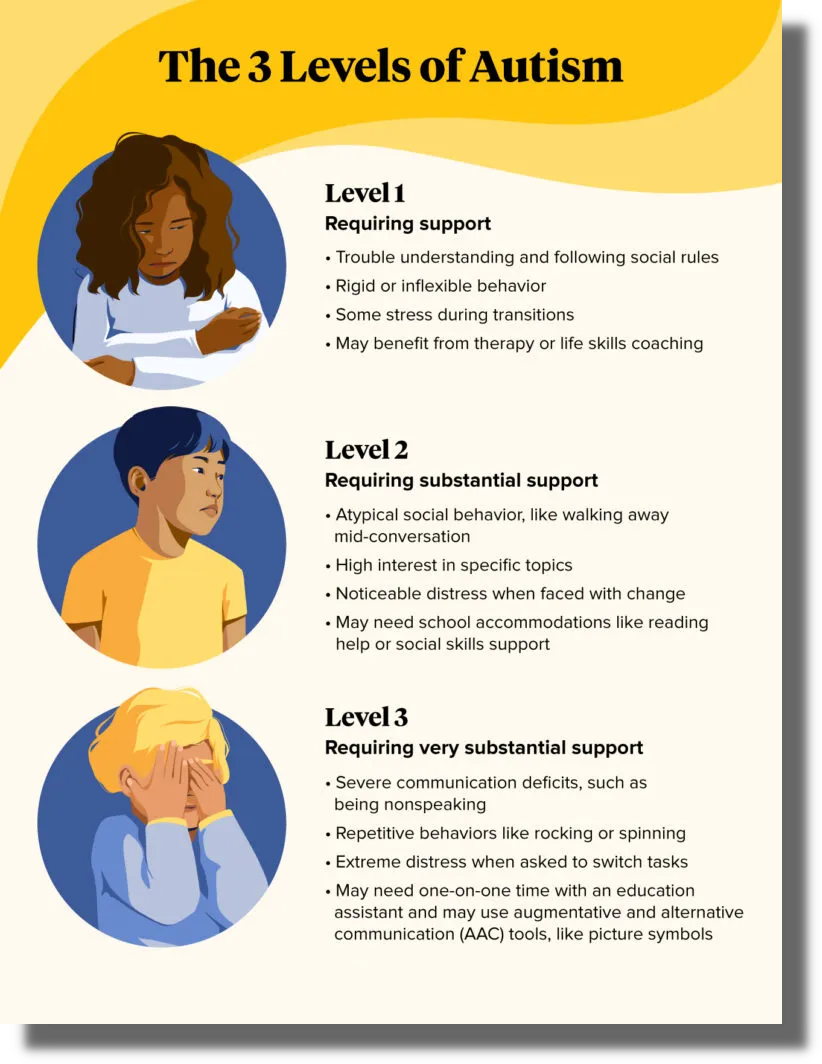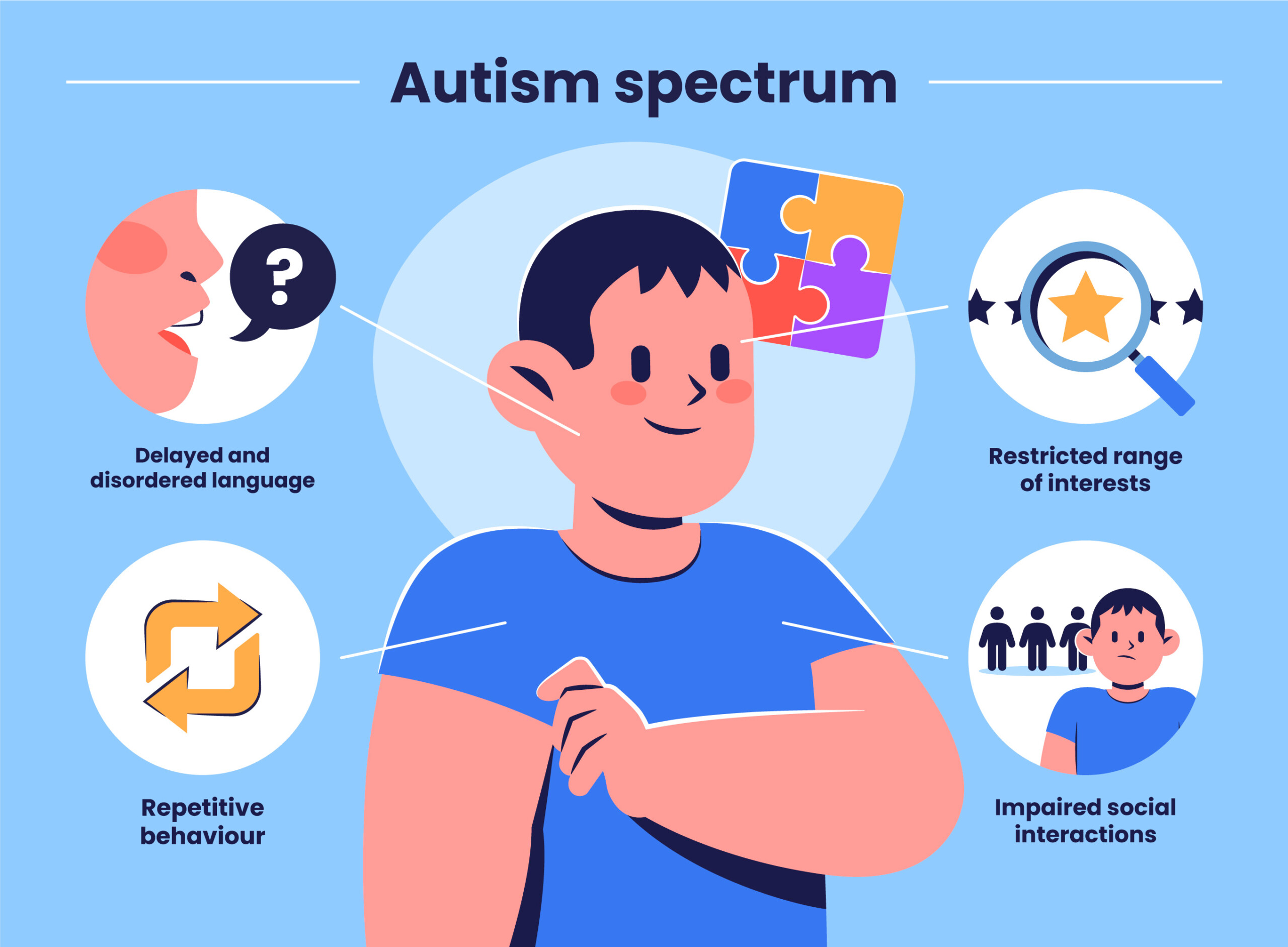How an Autism Therapist can transform your day-to-day structure for those living with autism
How an Autism Therapist can transform your day-to-day structure for those living with autism
Blog Article
Secret Symptoms And Signs to Identify in People With Behavioral Autism
When you come across somebody with behavior autism, acknowledging crucial indications and signs and symptoms is necessary. You could see obstacles in social interactions and communication, as well as a solid requirement for regimens. In addition, sensory level of sensitivities can bring about frustrating experiences. Understanding these attributes can improve your support and interventions, yet there's even more to reveal about exactly how these actions show up in daily scenarios. Let's discover what these indicators truly appear like.
Difficulties in Social Communications
When you communicate with a person on the autism range, you might see they battle with social hints and communication. These obstacles can make social interactions really feel overwhelming for them. You may see them staying clear of eye call or standing as well close or also away throughout discussions, which can produce misconceptions. They may not select up on body movement or facial expressions, making it harder for them to gauge exactly how others are really feeling.
When they do engage, they could speak about their rate of interests in excellent detail without observing if you're interested. Understanding these obstacles can help you come close to interactions with compassion and patience, promoting a much more comfy setting for both of you.
Trouble With Verbal and Non-Verbal Interaction

Recognizing these signs is important, as it aids you much better support and involve with people on the autism spectrum. By comprehending their interaction obstacles, you can promote a lot more meaningful connections and provide a more supportive atmosphere.
Repeated Habits and Routines
Interaction obstacles typically accompany various other indicators of autism, such as recurring behaviors and a solid choice for routines. You may discover that people with autism commonly take part in specific, repeated activities, like hand-flapping, rocking, or repeating expressions. These actions can give convenience and a sense of control in an often frustrating globe.
Routines are just as crucial; several people prosper when they adhere to a structured timetable. You might locate that adjustments to these regimens can result in considerable distress. If they have an everyday routine of eating breakfast at a certain time or adhering to a particular path to school, any kind of disruption can create anxiety.
Acknowledging these patterns helps you comprehend their behavior and give assistance. By accommodating their need for regular and enabling repeated actions, you can produce an extra comfortable setting that reduces their challenges.
Sensory Sensitivities

Typical Sensory Triggers
Sensory sensitivities can considerably influence everyday life for individuals with autism, as certain stimulations often activate frustrating responses. Common sensory triggers include loud noises, bright lights, and solid smells. You might see that abrupt sounds, like sirens or alarms, cause stress and anxiety or distress. Fluorescent lights in shops can feel unpleasant and extreme. Appearances can also play a significant function; harsh textiles or specific food structures might be unbearable for you. Additionally, crowded locations can bewilder your senses, making it tough to unwind or concentrate. Recognizing these triggers can aid you handle your setting better. By understanding what influences you, you can take actions to lessen pain and enhance your day-to-day experiences.
Behavior Feedbacks Described
Comprehending your behavior responses to sensory level of sensitivities is necessary, as they usually disclose exactly how you connect with the globe. You may observe that certain audios, lights, or textures overwhelm you, bring about stress and anxiety or discomfort. When confronted with these stimuli, you might take out, cover your ears, and even respond boldy. These actions aren't simply traits; they're your means of dealing with overstimulation. You may also locate yourself looking for certain sensory experiences, like deep pressure or silent settings, to aid ground on your own. Recognizing these patterns helps you recognize your requirements much better and can guide exactly how you interact them to others. By recognizing your sensory level of sensitivities, you can function in the direction of creating an atmosphere that feels much more comfortable and manageable for you.
Coping Techniques Introduction
Recognizing your sensory level more tips here of sensitivities is simply the initial step; currently it's time to explore coping approaches that can help you handle those experiences properly. Start by developing a sensory toolkit customized to your needs. This might include noise-canceling earphones, fidget toys, or soothing scents. Developing a structured routine can additionally provide predictability, minimizing anxiety around sensory overload. When you really feel overwhelmed, take breaks in a quiet space to collect yourself. Practicing mindfulness methods like deep breathing can help ground you in the moment. Furthermore, connect your requirements with those around you; having supportive loved ones can make a significant difference. Keep in mind, locating what works finest for you might take some time, so be patient and open to attempting brand-new approaches.
Limited Interests and Emphasis
While lots of people establish a variety of rate of interests, those with autism often show restricted rate of interests and an intense emphasis on particular topics. You may discover that someone with autism can invest hours delving right into their favorite topic, whether it's a certain type of train, a specific movie, or a clinical principle. This extreme emphasis isn't simply a pastime; it can end up being a main component of their identification and social interactions.
You may discover that discussions revolve around these passions, and they may have a hard time to involve in more comprehensive topics. By recognizing and acknowledging these restricted passions, you can cultivate an encouraging atmosphere where they really feel valued and recognized, allowing for more significant links and interactions.
Psychological Law Difficulties
Individuals with autism frequently face challenges in emotional guideline, which can be affected by their intense concentrate on details interests. You might notice that when a person is deeply participated in a favored activity, they can experience strong emotions, whether exhilaration or frustration. When points don't go as planned., this strength often makes it difficult for them to move gears or handle their feelings - Autism Therapist.

Variability in Developing Landmarks
When it comes to developing turning points, you'll observe that people with autism usually reveal a wide array of irregularity. You could see a youngster excel in language skills but battle with social communications.
It's vital to recognize that each individual's trip is special. Some might establish complicated skills early, just to deal with difficulties in the future. Others might take longer to achieve standard turning points however then flourish in specific locations. Observing these patterns can assist you comprehend their staminas and needs better.
Often Asked Questions
How Is Autism Identified in Kid and Grownups?
To diagnose autism in adults and youngsters, experts evaluate habits, interaction skills, and social interactions. If a private meets the criteria for autism spectrum problem., they commonly use standard tests, interviews, and monitorings to figure out.
Are There Different Kinds of Autism Spectrum Disorders?
Yes, there are you could try these out various kinds of autism range conditions, consisting of Asperger's syndrome and prevalent developmental disorder-not or else specified. Each type differs in seriousness and features, so comprehending these distinctions can aid you better support people with autism.
What Treatments Are Efficient for People With Autism?
When considering efficient treatments for individuals with autism, you'll discover choices like Applied Habits Evaluation, speech therapy, and work-related treatment. Each approach can assist boost interaction, social abilities, and everyday functioning tailored to private needs.
Can Individuals With Autism Lead Independent Lives?
Yes, people with autism can lead independent lives. With the appropriate go to website assistance, skills training, and resources, you can aid them develop self-sufficiency, handle everyday jobs, and prosper in numerous environments, promoting their self-reliance.
Just How Can Family Members Assistance Loved Ones With Autism?
You can support your enjoyed ones with autism by creating a structured environment, encouraging their interests, practicing persistence, cultivating interaction, and advertising social abilities. Commemorate their success, no issue how small, and build a supportive community.
Although many individuals on the autism range can recognize and utilize language, they typically deal with considerable challenges with both verbal and non-verbal communication. Recognizing these indications is necessary, as it assists you much better support and engage with individuals on the autism spectrum. You might notice that people with autism usually involve in certain, repeated activities, like hand-flapping, shaking, or repeating phrases.Sensory level of sensitivities can considerably affect everyday life for individuals with autism, as particular stimulations typically trigger frustrating reactions.When it comes to developing turning points, you'll discover that individuals with autism usually reveal a broad range of irregularity.
Report this page